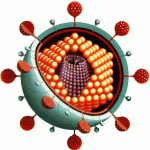Virology
|
28 may 2015 04:37:17 |
| A GSDMB enhancer-driven HSV thymidine kinase-expressing vector for controlling occult peritoneal dissemination of gastric cancer cells (Epidemiologic Perspectives & Innovations) |
|
Tweet Background:
Gastric cancer (GC) is one of the major malignant diseases worldwide, especially in Asia, and Japan and Korea have the highest incidence in the world. Because most of the cases that are refractory to therapies die due to peritoneal dissemination (PD) of the cancer cells, controlling PD is important for patient survival. GSDMB is a member of the gasdermin gene family. Because GSDMB is expressed in many types of cancer, including GC, it is likely that the gene contains a regulatory region that is utilized for therapy of occult PD through cancer cell-specific expression of cytotoxic genes.
Methods:
We performed reporter assays to identify the regulatory region for the cancer cell-specific expression. We also constructed a lentiviral therapeutic vector that expresses herpes simplex virus thymidine kinase (HSVtk) in a GC cell-specific manner, and tested it in a mouse model of PD.
Results:
We identified the regulatory region at +496 to +989 from the GSDMB transcription start site and designated it as a GSDMB enhancer. The lentiviral therapeutic vector suppressed proliferation of a GC cell line, 60As6, in vitro in the presence of ganciclovir, and intraperitoneal administration of the vector prolonged the survival term of mice that were intraperitoneally inoculated with 60As6 one week prior to the administration.
Conclusions:
The GSDMB-driven HSVtk expression vector had a therapeutic effect on the occult PD model mice. This strategy can potentially be used to treat GC patients with PD. |
| 137 viewsCategory: Pathology, Virology |
 The maize cytochrome P450 CYP79A61 produces phenylacetaldoxime and indole-3-acetaldoxime in heterologous systems and might contribute to plant defense and auxin formation (Epidemiologic Perspectives & Innovations) The maize cytochrome P450 CYP79A61 produces phenylacetaldoxime and indole-3-acetaldoxime in heterologous systems and might contribute to plant defense and auxin formation (Epidemiologic Perspectives & Innovations)Making health insurance pro-poor: evidence from a household panel in rural China (Epidemiologic Perspectives & Innovations) 
|
| blog comments powered by Disqus |
MyJournals.org
The latest issues of all your favorite science journals on one page
The latest issues of all your favorite science journals on one page



